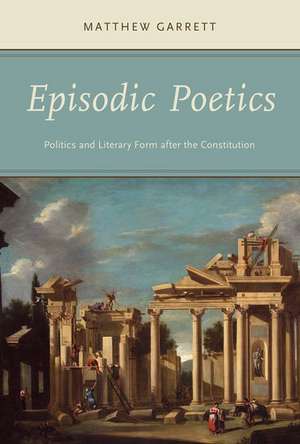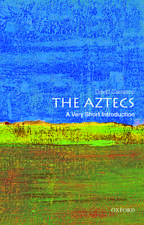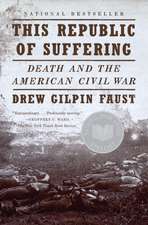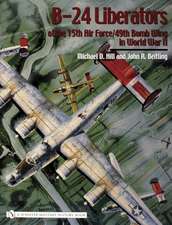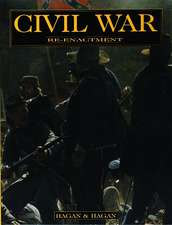Episodic Poetics: Politics and Literary Form after the Constitution
Autor Matthew Garretten Limba Engleză Paperback – 28 iun 2018
| Toate formatele și edițiile | Preț | Express |
|---|---|---|
| Paperback (1) | 241.92 lei 31-37 zile | |
| Oxford University Press – 28 iun 2018 | 241.92 lei 31-37 zile | |
| Hardback (1) | 521.63 lei 31-37 zile | |
| Oxford University Press – 3 apr 2014 | 521.63 lei 31-37 zile |
Preț: 241.92 lei
Preț vechi: 301.42 lei
-20% Nou
Puncte Express: 363
Preț estimativ în valută:
46.31€ • 50.32$ • 38.92£
46.31€ • 50.32$ • 38.92£
Carte tipărită la comandă
Livrare economică 10-16 aprilie
Preluare comenzi: 021 569.72.76
Specificații
ISBN-13: 9780190887445
ISBN-10: 0190887443
Pagini: 244
Dimensiuni: 231 x 155 x 18 mm
Greutate: 0.36 kg
Editura: Oxford University Press
Colecția OUP USA
Locul publicării:New York, United States
ISBN-10: 0190887443
Pagini: 244
Dimensiuni: 231 x 155 x 18 mm
Greutate: 0.36 kg
Editura: Oxford University Press
Colecția OUP USA
Locul publicării:New York, United States
Recenzii
The book's theoretical commitments bear special mention because they mark its relatively unique relationship to ongoing debates about historicism and literary form. Episodic Poetics is part of the resurgence of new scholarship on aesthetics, but Marxist criticism has not been particularly popular in this work, which has tended to identify Marxism (via Jameson) with the mandates of historical contextualization. And yet, perhaps for this very reason, the book's engagement with a range of older formalisms moves it toward a newly flexible, structural account of the form of politics.
For Garrett, literary form is both a reflection of and engagement with social practices. Texts simultaneously represent and 'make' history. Garrett reads these particular works as symbols of the factionlism, unrest, and divisions within the early republic.
Garrett's book is learned and imaginatively expansive, and I took great pleasure in following him as he navigated discussions of Russian formalism, analyses of eighteenth-century business manuals, close readings of The Odyssey, examinations of the aesthetic theories of Lord Kames and Hugh Blair, a consideration of Roland Barthes's distinction between cardinal and catalytic functions-to identify only some of the literary avenues through which he guides us. ...[A] delightful exercise in reading episodically.
Matthew Garrett's extraordinary Episodic Poetics: Politics and Literary Form After the Constitution explores the complex textures that resulted when the post-constitutional moment's consolidating energies found verbal expression in the fragmentary form of the period's literary production. ... The representative texts of Garrett's four genres, via their respective logics of contagion, error, hesitation, and volubility helped delineate the contours of the political. Episodic Poetics' investigation of these dynamics is as theoretically sophisticated as it is elegantly constructed, and in what follows I can only gesture at the readerly pleasures that attend following the involutions of its nuanced argument.
How did pluribus become unum in the early United States? Matthew Garrett's Episodic Poetics reveals that the formal problem of integrating and consolidating parts into a whole connected politics with literature in the early republic. Focusing on the serialization of political tracts, the organization of events in autobiography, and the marketing of digressive fictions, Garrett makes a provocative case for the history of literary form as an integral part of political history.
Episodic Poetics is an innovative, learned, challenging account of the politics of form and the form of politics in the early Republic. Garrett makes a persuasive case that narrative plotting is key to understanding both the richness of early national writing and the ideological contradictions of U.S. nation formation.
A powerful, unexpected new roadmap to the culture of the early republic. In Garrett's hands, literary form becomes the place where theory and history meet to tell a new story about a tired corner of American culture. A maverick and often beautiful book that resets the table for early Americanists.
In this erudite study, Garrett resuscitates the episode
Matthew Garret's Episodic Poetics: Politics and Literary Form after the Constitution (2014), examines...the sub-generic feature of the "episode." Bringing this often overlooked narrative unit to the forefront allows Garrett to examine works from the early American Republic, not only revealing unexpected connections and resonances but also shedding light on formal aspects of Early Republic literature
For Garrett, literary form is both a reflection of and engagement with social practices. Texts simultaneously represent and 'make' history. Garrett reads these particular works as symbols of the factionlism, unrest, and divisions within the early republic.
Garrett's book is learned and imaginatively expansive, and I took great pleasure in following him as he navigated discussions of Russian formalism, analyses of eighteenth-century business manuals, close readings of The Odyssey, examinations of the aesthetic theories of Lord Kames and Hugh Blair, a consideration of Roland Barthes's distinction between cardinal and catalytic functions-to identify only some of the literary avenues through which he guides us. ...[A] delightful exercise in reading episodically.
Matthew Garrett's extraordinary Episodic Poetics: Politics and Literary Form After the Constitution explores the complex textures that resulted when the post-constitutional moment's consolidating energies found verbal expression in the fragmentary form of the period's literary production. ... The representative texts of Garrett's four genres, via their respective logics of contagion, error, hesitation, and volubility helped delineate the contours of the political. Episodic Poetics' investigation of these dynamics is as theoretically sophisticated as it is elegantly constructed, and in what follows I can only gesture at the readerly pleasures that attend following the involutions of its nuanced argument.
How did pluribus become unum in the early United States? Matthew Garrett's Episodic Poetics reveals that the formal problem of integrating and consolidating parts into a whole connected politics with literature in the early republic. Focusing on the serialization of political tracts, the organization of events in autobiography, and the marketing of digressive fictions, Garrett makes a provocative case for the history of literary form as an integral part of political history.
Episodic Poetics is an innovative, learned, challenging account of the politics of form and the form of politics in the early Republic. Garrett makes a persuasive case that narrative plotting is key to understanding both the richness of early national writing and the ideological contradictions of U.S. nation formation.
A powerful, unexpected new roadmap to the culture of the early republic. In Garrett's hands, literary form becomes the place where theory and history meet to tell a new story about a tired corner of American culture. A maverick and often beautiful book that resets the table for early Americanists.
In this erudite study, Garrett resuscitates the episode
Matthew Garret's Episodic Poetics: Politics and Literary Form after the Constitution (2014), examines...the sub-generic feature of the "episode." Bringing this often overlooked narrative unit to the forefront allows Garrett to examine works from the early American Republic, not only revealing unexpected connections and resonances but also shedding light on formal aspects of Early Republic literature
Notă biografică
Matthew Garrett is Assistant Professor of English and American Studies at Wesleyan University.
